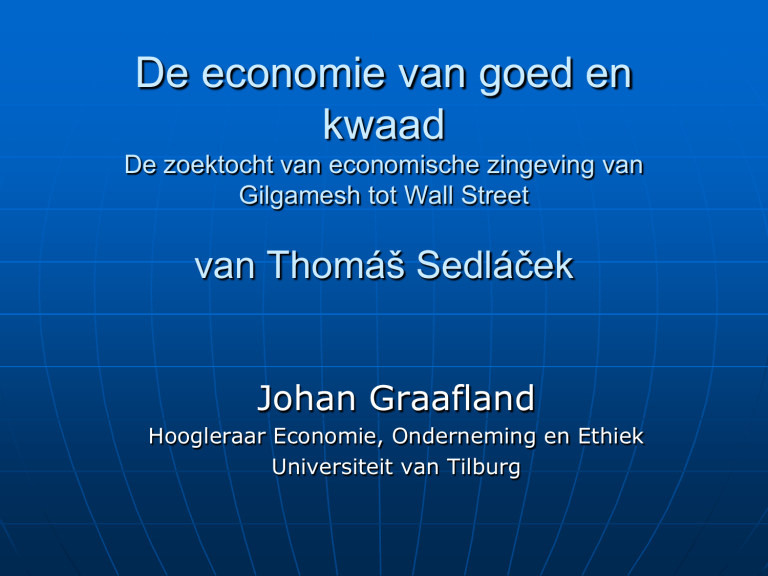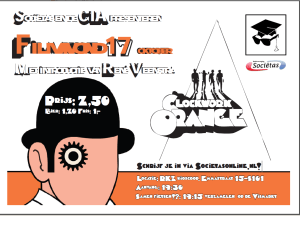
De economie van goed en
kwaad
De zoektocht van economische zingeving van
Gilgamesh tot Wall Street
van Thomáš Sedláček
Johan Graafland
Hoogleraar Economie, Onderneming en Ethiek
Universiteit van Tilburg
Opzet boek
• Deel 1:De economie in de oudheid
• Gilgamesh epos / Oude Testament / Oude Griekenland
/ Nieuwe Testament / Descartes / Mandeville / Smith
• Deel 2: Mythen in de huidige economie
• Hebzucht / vooruitgang/onzichtbare hand / homo
economicus / dierlijk instinct / wiskunde
• Toepassing op kredietcrisis
Centrale these van Sedláček boek
• Kennis van mythen en verhalen zijn onmisbaar in
economische wetenschap
• Moderne economische theorieën zijn nieuwe
wiskundige vormen van meta-economische verhalen in
oude mythen
• Al deze verhalen gaan over goed en kwaad
• Economen moeten toegeven dat economie inherent
normatief is
Inhoud
(Afsluiting 6 maart: liefde en kwaad in de economie)
1 De Mandeville: kwaad is nodig voor welvaart
Discussie
2 Adam Smith:
•
•
•
•
Onzichtbare hand
Maar mens is sociaal wezen
Rol van deugden
Eigenbelang, de deugd van prudentie en homo economicus
Discussie: Toepassing op economische crisis
3 Hebzucht, economische vooruitgang en vrede
• John Stuart Mill, John Maynard Keynes
discussie
Het kwaad bevordert de welvaart
Mandeville (1714; Nederlandse arts)
Keerpunt in The fable of the
bees
Deel 1: Ondeugden regeren
• Thus every Part was full of Vice, [155]
Yet the whole Mass a Paradice
Hypocriet gebed:
• But all the Rogues cry'd brazenly
Good Gods, had we but Honesty!
De god Jupiter antwoordt hun gebed
• But Jove, with Indignation moved,
At last in Anger swore, He'd rid [230]
The bawling Hive of Fraud, and did
The very Moment it departs
Deel 2: Deugden regeren
• Gevolg: geen vraag naar goederen; armoede
en verval
Sociale welvaart danken wij aan
private ondeugden
Envy it self, and vanity
Were ministers of Industry
…
That strange ridic’lous vice was made,
The very wheel that turn’d the trade
Fools only strive
To make a Great an honest Hive.
…
Fraud, Luxury, and Pride must live
Will we the Benefits receive
Discussie 1
* Hebzucht diefstal politie / verzekeringen
werkgelegenheid
* Angst en oorlogszucht wapens innovatie groei
* Jaloezie vraag naar luxe goederen welvaart
* Trots behoefte aan status geven aan goede doelen
Vragen
• Gaan ethiek en welvaart wel samen?
• Is hebzucht noodzakelijk voor vooruitgang; leidt
tevredenheid tot economische malaise?
• Is roep om integriteit niet hypocriet?
Adam Smith: De onzichtbare hand
Baten worden bereikt door nastreven van
eigenbelang: orde ipv chaos
Wealth of nations:
The businessman ’intends only his
own gain, and he is in this, as in
many other cases, led by an
invisible hand to promote an end
which was no part of his
intention...By pursuing his own
interest he frequently promotes
that of the society more
effectually than when he really
intends to promote it’
Invisible hand zorgt ook voor verdeling
Theory of Moral Sentiments:
He (Landlord) is led by an invisible hand to make nearly the same
distribution of the necessaries of life which would have been made
had the earth been divided into equal portions among all its
inhabitants; …When providence divided the earth among a few
lordly masters, it neither forgot nor abandoned those who seemed
to have been left out in the partition. These last, too, enjoy their
share of all that it produces. In what constitutes the real happiness
of human life, they are in no respect inferior to those who would
seem so much above them.’
Deugdenethiek van Adam
Smith
Maar Adam Smith hangt in Theory of
Moral Sentiments deugden ethiek aan en
keert zich tegen Mandeville
Combinatie van menselijke drijfveren
• Nastreven van eigen belang als de deugd van
prudentie (voorzichtigheid)
• Welwillendheid en empathie
• Behoefte aan wederkerige sympathie
• Onpartijdige toeschouwer
Prudentie en de homo economicus
Prudence: Zorgvuldige aandacht voor de
consequenties van elke handeling voorzover
deze het eigen geluk beïnvloeden
• Combineert eigenbelang en rationaliteit
• Oftewel: welbegrepen eigenbelang
Centrale deugd van de homo economicus
Moeder van andere deugden (ijver,
matigheid, e.d.)
‘The resolute firmness of the person who acts in this
manner necessarily commands our approbation… We
not only approve, therefore, but in some measure
admire his conduct and think it worthy of a
considerable degree of applause’
Benevolence
(welwillendheid)
Zorg voor het geluk van anderen
Concentrische cirkels
Welwillendheid voor vreemden is beperkt
‘it is not from the benevolence of the butcher, the
baker and the brewer that we expect our dinner, but
from their regard for their own self-interest… Nobody
but a beggar chuses to depend chiefly upon the
benevolence of his fellow-citizens’
‘The care of the universal happiness of all rational and
sensible beings is the business of God, and not of man.
To man is allotted a much humbler department, but
one much more suitable to the weakness of his powers
-the care of his own happiness, of that of his family, his
friends, his country’
Justice (rechtvaardigheid)
Innerlijke zorg om geen
kwaad te doen aan de ander
Deugd van de
rechtvaardigheid is nuttiger
voor de samenleving dan de
deugd van de welwillendheid
They have it so much in their power to hurt others…that if
this principle (of justice) did not stand up within them in
their defense, they would like wild beasts, be at all times
ready to fly upon them
Discussie 2
• Wat is de relatie tussen (gebrek aan)
deugden en kredietcrisis?
•
•
Hebben ondeugden bijgedragen aan ontstaan van crisis?
Vereist herstel vernieuwde rol van ethiek?
Opties
• 1 Economische crisis heeft vooral economische oorzaken
(gebrekkig toezicht; systeemrisico’s; verkeerde prikkels);
geen kwestie van deugden
• 2 Welbegrepen eigenbelang (prudentie) is cruciaal; andere
deugden zijn franje
• 3 Welbegrepen eigen belang schiet tekort voor gezonde
economische ontwikkeling; andere deugden zijn ook nodig
Hebzucht en genoeg
Een persoonlijke ervaring
De economie van nooit genoeg
onverwoestbaar tekort
verlangens groeien even snel als de middelen om er in
te voorzien
Geen premanente bevrediging
De mens is gedoemd te streven naar een doel dat zich
steeds terugtrekt
Stigler: wens is niet bevrediging van verlangens, maar
meer en betere verlangens
gebrek uitvinden, want dat dwingt tot nieuwe
activiteiten en creatieve destructie
Geluk bestaat in het najagen van geluk
Indien de economie haar doel verliest, dan blijft alleen
groei over als doel – groei die niet kent buiten zichzelf
Dromen van het eind van de
hebzucht: John Stuart Mill
‘The best state for
human nature is that in
which, while no one is
poor, no one desires to
be richer’
People will be content to
be stationary, long before
the exhaustion of the
earthly resources would
compel them to it
Dromen van het einde van de
hebzucht: Keynes
Economische groei zal op
lange termijn het
economisch probleem,
schaarste, oplossen
I see us free, therefore, to
return to some of the most
sure and certain principles
of religion and traditional
virtue – that avarice is a
vice,…and the love of money
is detestable…’
Discussie 3
Waar moeten wij naar streven?
• Voortgaande economische groei?
Vertrouwen op economen als bezielende evangelisten van de
vooruitgang
TINA
• Of: opwaarste spiraal van verlangens beperken en in
plaats daarvan naar immateriële waarden streven
J.S Mill / J.M. Keynes: de tijd is al aangebroken!
Rust zoeken in de geest ipv in de materie (de sabbateconomie)
Wat verwachten wij op lange termijn? Waarom?












